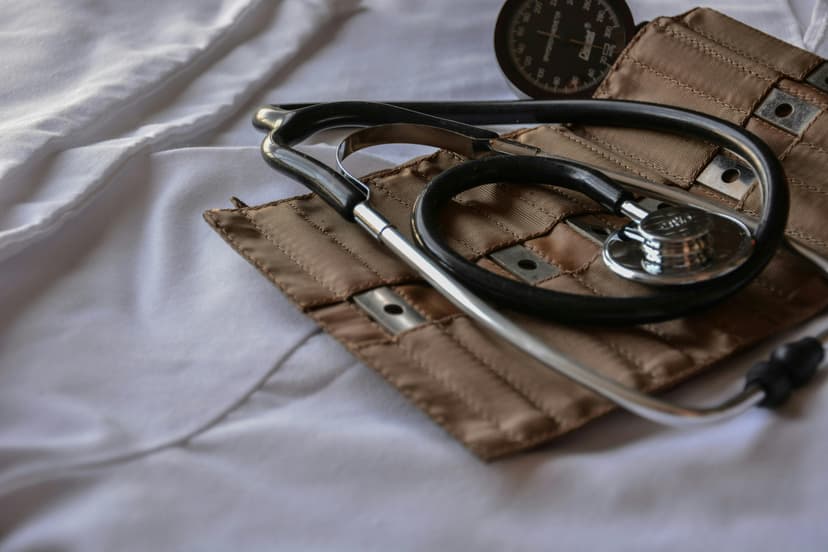How to Write an Effective Medical School Letter of Recommendation
Learn how to write a compelling medical school letter of recommendation with our comprehensive guide.
Posted June 13, 2025

Join a free event
Learn from top coaches and industry experts in live, interactive sessions you can join for free.
Table of Contents
If you are applying for medical school, one of the most important components of your application is the letter of recommendation. This letter offers a glimpse into your character, work ethic, and potential as a medical student and future physician. However, not all letters of recommendation are created equal. In order to stand out among other applicants, you need a strong and effective letter of recommendation. In this article, we will discuss everything you need to know about writing an effective medical school letter of recommendation.
Understanding the Purpose of a Medical School Letter of Recommendation
Before we dive into the details of writing a strong letter of recommendation, let's first understand the purpose of this document. The letter of recommendation serves as a written evaluation of your character, academic ability, and potential. It aims to provide admissions committees with an objective perspective on your abilities as a prospective medical student and future physician. In essence, the letter of recommendation should support your application and highlight your strengths.
One important aspect to keep in mind is that the letter of recommendation should come from someone who knows you well and can speak to your abilities and potential. This could be a professor, advisor, or supervisor who has worked closely with you and can provide specific examples of your strengths and accomplishments.
It's also important to note that the letter of recommendation is just one part of your overall application. While it can certainly help strengthen your candidacy, it's not the only factor that admissions committees will consider. Your academic record, personal statement, and other application materials will also be taken into account when making their decision.
What Makes a Strong Medical School Letter of Recommendation?
So, what makes a strong medical school letter of recommendation? Firstly, a strong letter of recommendation should come from someone who knows you well, such as a professor, supervisor, or mentor. Ideally, this person should have worked with you in an academic or professional setting, and can vouch for your skills, abilities, and work ethic.
In addition, a strong letter of recommendation should highlight specific examples of your accomplishments, skills, or characteristics that make you stand out from other students. This could include your ability to work as part of a team, your problem-solving skills, or your dedication to patient care.
Finally, a strong letter of recommendation should be well-written and free of errors. It should be a thoughtful and honest assessment of your abilities.
Another important aspect of a strong medical school letter of recommendation is the level of detail provided. The letter should not only mention your achievements but also provide specific examples of how you demonstrated those achievements. For instance, if the letter mentions your ability to work as part of a team, it should also provide an example of a project or task where you demonstrated this skill.
Furthermore, a strong letter of recommendation should also address any weaknesses or challenges you may have faced. This shows that the recommender has a well-rounded understanding of your abilities and is not just highlighting your strengths. It also demonstrates your ability to overcome obstacles and challenges, which is an important quality in a medical school candidate.
Tips for Selecting the Right Recommender for Your Medical School Application
Selecting the right recommender for your medical school application is crucial to obtaining a strong letter of recommendation. When considering potential recommenders, think about who knows you best and can provide a detailed evaluation of your skills and abilities.
It's also important to consider the professional standing of your recommender. A letter of recommendation from a well-known and respected physician or academic can carry a lot of weight with admissions committees.
Finally, make sure you ask your potential recommender if they are willing to write you a strong letter of recommendation. If they are hesitant or unsure, it may be best to consider another recommender who can fully support your application.
Another important factor to consider when selecting a recommender is their familiarity with the medical school application process. Recommenders who have experience with medical school applications can provide valuable insight and guidance on how to present yourself in the best possible light. They may also be able to offer advice on how to tailor your application to specific schools or programs.
Preparing Your Recommender to Write an Effective Medical School Letter of Recommendation
Once you have selected a recommender, it's important to prepare them to write an effective letter of recommendation. Provide them with a copy of your resume, transcripts, and any other information or materials that may help them in writing their letter.
In addition, it's helpful to provide your recommender with information about the medical schools you are applying to, as well as any specific requirements or criteria that each school may have for their letters of recommendation.
Another important aspect to consider when preparing your recommender is to give them a clear understanding of your personal and academic achievements. This will help them to highlight your strengths and accomplishments in their letter of recommendation. You can also provide them with a list of qualities or characteristics that you would like them to emphasize in their letter, such as your leadership skills, dedication to community service, or ability to work well in a team.
Common Mistakes to Avoid in Your Medical School Letter of Recommendation
While there are many tips for writing a strong medical school letter of recommendation, it's also important to know what common mistakes to avoid. Firstly, avoid selecting recommenders who do not know you well or cannot write a detailed and honest evaluation of your abilities.
Furthermore, avoid overly generic or formulaic letters of recommendation. Admissions committees are looking for personalized and detailed evaluations that showcase your unique strengths as a candidate.
Finally, be sure to proofread your letter of recommendation for errors or typos. A letter that is riddled with mistakes or inaccuracies can harm your application rather than help it.
Another common mistake to avoid is asking for a letter of recommendation from someone who is not in the medical field. While it may be tempting to ask a professor or employer from a different field who knows you well, their evaluation may not carry as much weight with medical school admissions committees.
Additionally, avoid waiting until the last minute to ask for a letter of recommendation. Give your recommenders plenty of time to write a thoughtful and detailed evaluation of your abilities. Rushed letters may not be as strong or effective in showcasing your strengths as a candidate.
Examples of Effective Medical School Letters of Recommendation
While every letter of recommendation will vary based on the student and recommender, there are certain elements that effective letters of recommendation tend to have in common. Here are a few examples:
- A letter that highlights specific examples of the student's leadership abilities
- A letter that highlights the student's commitment to community service or volunteer work
- A letter that discusses the student's impressive academic record
- A letter that describes the student's passion for medicine and dedication to patient care
How to Follow Up with Your Recommender After Submitting Your Application
Once you have submitted your medical school application, it's important to follow up with your recommender to ensure that they have submitted their letter of recommendation. Send them a polite email or letter to thank them for their time and let them know that you appreciate their support.
It's also important to keep your recommenders updated on your application status and to let them know if you have received any offers or invitations for interviews.
The Importance of Personalizing Your Medical School Letter of Recommendation
As we mentioned earlier, a strong medical school letter of recommendation should be personalized and highlight your unique strengths and skills. Admissions committees want to see what sets you apart from other students, so it's important to choose a recommender who can speak specifically to your abilities, accomplishments, and potential as a medical student and future physician.
How to Request a Letter of Recommendation for Medical School
When requesting a letter of recommendation for medical school, it's important to do so in a polite and professional manner. Start by asking your potential recommender if they are willing to write a letter of recommendation on your behalf.
Provide them with any necessary information or materials that may help them in writing their letter, and be sure to give them ample time to complete the letter before your application deadline.
Writing Style and Tone for a Medical School Letter of Recommendation
A letter of recommendation for medical school should be written in a professional and formal tone. It should avoid any casual or overly familiar language. Stick to the facts and be sure to avoid exaggerating or fabricating any information about the student.
Finally, be sure to proofread the letter for errors and typos. A well-written and error-free letter can make a good impression on admissions committees.
What to Include in a Strong Medical School Letter of Recommendation
A strong medical school letter of recommendation should include the following:
- A clear and detailed evaluation of the student's abilities, skills, and potential as a medical student and future physician
- Specific examples or anecdotes that highlight the student's unique strengths and accomplishments
- An assessment of the student's character, work ethic, and interpersonal skills
- An endorsement of the student's suitability for medical school
How Admissions Committees Evaluate Letters of Recommendation for Medical School
Admissions committees evaluate letters of recommendation for medical school based on several factors. Firstly, they consider the credibility and professional standing of the recommender. They also look for evidence of the student's academic ability, personal qualities, and potential as a medical student and future physician. Finally, they evaluate the overall tone and content of the letter of recommendation, looking for evidence of a personalized and thoughtful evaluation of the student.
Tips for Writing a Compelling Introduction and Conclusion in Your Medical School Letter of Recommendation
The introduction and conclusion of your medical school letter of recommendation are just as important as the main content. A compelling introduction should grab the reader's attention and provide a brief overview of the student's background and accomplishments.
The conclusion should tie everything together and make a final statement about the student's potential and suitability for medical school. It should leave the reader with a positive impression of the student and their abilities.
The Role of Honesty and Integrity in Your Medical School Letter of Recommendation
Honesty and integrity are crucial components of an effective medical school letter of recommendation. The letter should provide an honest and accurate evaluation of the student's abilities and potential. It should avoid any exaggerations or fabrications, as these can harm the student's application and reputation. In addition, the letter should demonstrate the recommender's integrity and commitment to providing an objective and thoughtful evaluation of the student.
Overall, a strong and effective medical school letter of recommendation can make all the difference in your application. By following the tips and guidelines outlined in this article, you can increase your chances of obtaining a strong and personalized letter of recommendation that highlights your unique strengths and potential as a medical student and future physician.
Browse hundreds of expert coaches
Leland coaches have helped thousands of people achieve their goals. A dedicated mentor can make all the difference.


















